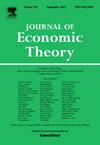团队合作中的职业经济学
IF 1.2
3区 经济学
Q3 ECONOMICS
引用次数: 0
摘要
本文考察了职业团队成员的激励机制,其中努力和才能可以互为替代(Holmström, 1999)或互补(Dewatripont et al., 1999)。研究表明,努力与天赋的互补程度决定了团队中哪个成员付出更多的努力,从而在团队绩效后获得或失去更多的声誉。这篇论文认为,组织可以通过促进对集体声誉的关注来提高激励。实现这一目标的策略包括促进团队合作,限制对个人人才的外部竞争,以及积极将人才分类为团队。本文进一步探讨了当组织容易获得个人产出时,激励团队的最佳绩效评级。这些评级通常偏离团队的产出,甚至可能引发竞争,这取决于信噪比和天赋相关性。本文章由计算机程序翻译,如有差异,请以英文原文为准。
The economics of career concerns in teamwork
This paper examines incentives in teams of career-concerned members, where effort and talent can be substitutes (Holmström, 1999) or complements (Dewatripont et al., 1999). It is shown that the degree of effort-talent complementarity determines which team member exerts more effort and thus gains or loses more reputation following team performance. The paper argues that organizations can boost incentives by promoting concern for collective reputation. Strategies to achieve this include facilitating team cooperation, limiting external competition for individual talent, and positively sorting talent into teams. The paper further explores optimal performance ratings to motivate teams when the organization has easy access to individual outputs. These ratings generally deviate from team output and may even induce competition, depending on the signal-to-noise ratio and talent correlations.
求助全文
通过发布文献求助,成功后即可免费获取论文全文。
去求助
来源期刊

Journal of Economic Theory
ECONOMICS-
CiteScore
2.50
自引率
12.50%
发文量
135
期刊介绍:
The Journal of Economic Theory publishes original research on economic theory and emphasizes the theoretical analysis of economic models, including the study of related mathematical techniques. JET is the leading journal in economic theory. It is also one of nine core journals in all of economics. Among these journals, the Journal of Economic Theory ranks fourth in impact-adjusted citations.
 求助内容:
求助内容: 应助结果提醒方式:
应助结果提醒方式:


